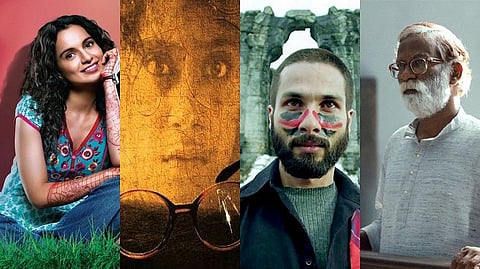
- Home
- न्यूजग्राम
- NewsGram USA
- India
- World
- Politics
- Entertainment
- Culture
- Lifestyle
- Economy
- Sports
- Sp. Coverage
- Misc.
- NewsGram Exclusive
- Jobs / Internships

By Shreya Upadhyaya
If there's anything that has been constant for Hindi film actress Kangana Ranaut since 2013, apart from rumours, it is the appreciation for her performance in the critically acclaimed and commercially successful 'Queen'. And this year's National Film Award for the Best Actress was another feather to her hat. The Vikas Bahl-directed flick went on to win the Best Hindi Film as well.
Vishal Bharadwaj's 'Haider', an adaptation of Shakespeare's Hamlet, won the most awards – Best Music Direction, Best Dialogue, Best Male Playback Singer, Best Choreography and Best Costumes.
National Film Awards 2015 are a mix of popular cinema as well as films with a niche audience. Most of the narratives explore different genres and weave stories that reflect the changing Indian society.
'Court', a little known quadrilingual film, was adjudged the Best Feature Film. Directed by Chaitanya Tamhane, the movie depicts the "mundaneness of judicial procedure" and the "heart-wrenching insensitivity of institutional structures." It was released in Hindi, English, Marathi and Gujarati last year and narrates the story of the trial of an ageing folk singer charged with abetting the suicide of a sewage worker, through his music.
While 'Naanu Avanalla Avalu' (Kannada) is a film on transgenders, 'Ain' (Malyalam) is a story set in a Muslim household, how one of its members happens to witness a murder and his escape thereafter. Kannada actor Vijay won the Best Actor Award for "his subtle and non-stereotypical" portrayal of a woman trapped in a man's body for 'Nanu Avanalla Avalu'.
Thriller 'Chotushkone' (Bengali) directed by Srijit Mukherji is a film about four directors coming together for a film with four different stories, all thematically connected by a common thread — death.
'Kuttram Kadithal' (Tamil) revolves around how one unexpected incident influences people from diverse lifestyles. Bengali filmmaker Aditya Vikram Sengupta's debut 'Asha Jaoar Majhe' is a story that unfolds two lives suspended amid the threat of an escalating recession.
Animation film 'Sound of Joy' tells the story of today's kids, struggling with their aspirations and expectations and how they get inspired by stories of Biley (childhood name of Swami Vivekananda).
Shot in Orissa's Rayagada district, 'I cannot give you my forest' is a film that explores and tries to spread the importance of forest food in the tribal culture. Its focus on such an integral and crucial environment issue has made it bag several prestigious awards globally.
'Nachom-ia Kumpasar' (Konkani) is based on the lives of two musicians and is narrated through over 20 popular Konkani songs from the 1960s and 1970s that have been re-recorded for this film. 'Killa' (Marathi) portrays the life of a young boy who has a hard time settling in his new countryside home after his father's death in their previous city home. Several other films were awarded in different categories.
With filmmakers across the country daring to unveil, explore and narrate untold stories, forgotten accounts and ignored events, the National Film Awards always come in as confirmation of what India takes pride in – Unity in Diversity.
